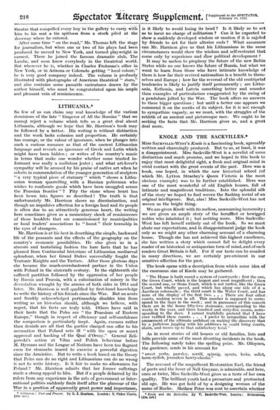LITHUANIA.*
So few of us can claim any real knowledge of the various dominions of the late " Emperor of All the Russias " that we cannot reject a volume which tells us a great deal about Lithuania, although we hope that Mr. Harrison's book may be followed by a better. His writing is without distinction and the work lacks cohesion and proportion. He certainly has courage, or the valour of ignorance, when he plunges into such a curious romance as that of the ancient Lithuanian language and reveals an ignorance of Greek and Latin which might have been hidden ; or writes of the country's music in terms that make one wonder whether some trusted in- formant was really a malicious jester ; and what art-lover's sympathy will be aroused by his praise of native art when he selects in commendation of the younger generation of sculptors " a very typical piece of statuary " which " shows a Lithu- anian woman quarrelling with a Russian policeman who wishes to confiscate goods which have been smuggled across the Prussian frontier " ? Pity the stone whose heart has been hewn into figures so described The truth is that unfortunately Mr. Harrison shows no discrimination, and though an impulsive affection for a foreign land and its people is often due to an attractively generous heart, the writing here sometimes gives us a momentary shock of reminiscence of those booklets that are commissioned by municipalities or local traders' associations to " boost " their township in the eyes of strangers.
'Mr. Harrison is at his best in describing the simple, backward life of the peasants and the effects of the geography on the country's economic possibilities. He also gives us in a staccato and tantalizing fashion the bare facts that he has gleaned from Continental historians of Lithuanian mediaeval splendour, when her Grand Dukes successfully fought the Teutonic Knights and the Tartars. After those glorious days she became the much-overshadowed partner in the Union with Poland in the sixteenth century. In the eighteenth she suffered partition followed by the oppression of her people by Russia and Prussia, with a culmination of misery in the devastation wrought by the armies of both sides in 1914 and later. Mr. Harrison is well qualified by first-hand knowledge to write the history of his friends since the War. But an acute and frankly acknowledged partisanship disables him from writing as an historian should, although we believe, with regret, that his facts are truly told. Others have said in their haste that the Poles are " the Prussians of Eastern Europe," though in respect of efficiency and self-confidence the comparison is particularly inept. Again, excuses rather than denials are all that the parties charged can offer to his accusation that Poland acts ill " with the open or secret approval and backing of the Quai d'Orsay." General 7&li- gOwski's action at Vilna and Polish behaviour before M. Hymans and the League of Nations have been too flagrant even for stomachs inured to exercise a powerful digestion since the Armistice. But to write a book based on the theory that Poles can do no right and Lithuanians can do no wrong is not to write history. Is it fair to make no allowances for Poland ? Mr. Harrison admits that her former sufferings made a strong appeal to him. But if a people debarred by its rulers from any experience in the arts of government or inter- national politics suddenly finds itself after the glamour of the War in a position of apparently great power and importance, • Lithuania Pas! and Present. By it. ), Harrison, London: T, Maher linwin. DAL net.I
is it likely to avoid losing its head ? Is it likely so to act as to incur no charge of militarism ? Can it be expected to show a suddenly developed wisdom or caution if it is cajoled by friends to act for their ulterior ends ? What assurance can Mr. Harrison give us that his Lithuanians in the same circumstances would show the wisdom and self-restraint that come only by experience and slow political development ?
It may be useless to prophesy the future of the new Baltic States while no one knows the future of Russia, but what we want to learn from those who have intimate knowledge of them is how far their revived nationalism is a benefit to them- selves and Europe ; how far the reversal of the old centripetal tendencies is likely to justify itself permanently ; are Lithu- ania, Esthonia, and Latvia something better and sounder than examples of particularism exaggerated by the swing of a pendulum jolted by the War. The book offers no answers to these bigger questions ; but until a better one appears we commend it on the merits of its subject, for it is not enough to sympathize vaguely, as we must, with the struggles of the rebirth of an ancient and picturesque race. We ought to be seeking the facts that Mr. Harrison gives us, and a great deal more.


































































 Previous page
Previous page